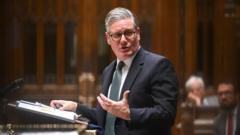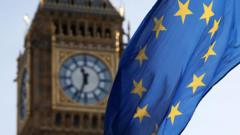Official statistics reveal a steep decline in net migration to the UK, as new government measures take effect amid a changing political landscape.
Britain Sees Significant Decrease in Immigration Rates

Britain Sees Significant Decrease in Immigration Rates
Net migration falls by 50% in 2024, highlighting a shift in immigration dynamics in the UK.
In a significant shift, Britain has recorded a staggering 50% drop in net migration for 2024, according to recent government estimates released on Thursday. The anticipated decline from 860,000 in 2023 to 431,000 signals the potential end of a period marked by high immigration levels.
The announcement follows Prime Minister Keir Starmer's recent claims about the need to seize "back control of our borders." He cautioned that unchecked immigration risks transforming Britain into an "island of strangers" rather than a cohesive nation. This sharp contrast between Starmer's rhetoric and the latest statistics indicates the complexities arising from the ongoing discourse on immigration post-Brexit.
Analysts believe that this reduction largely results from stricter immigration regulations enacted under the previous Conservative administration, responding to intense pressures to rein in migration rates following the Brexit vote. Starmer's Labour government appears to be continuing this trajectory, implementing new measures aimed at tightening migration standards further.
Sunder Katwala, director of British Future, noted the irony in the scenario, suggesting that the previous government's inability to meet its own migration target allowed Starmer to benefit from the resulting decrease. The Office for National Statistics (ONS), which releases biannual estimates on immigration flows, indicated that the latest decline was primarily attributed to reduced incoming work and study visas as well as an uptick in emigration among those who had initially arrived as students.
The data highlights that the number of individuals accompanying foreign students dropped significantly, with an estimated 86% reduction noted in net arrivals of student dependents, marking the most substantial fall across all demographics. As the UK navigates these shifts, the political implications regarding immigration will continue to evolve, reflecting broader societal concerns on national identity and cohesion.
The announcement follows Prime Minister Keir Starmer's recent claims about the need to seize "back control of our borders." He cautioned that unchecked immigration risks transforming Britain into an "island of strangers" rather than a cohesive nation. This sharp contrast between Starmer's rhetoric and the latest statistics indicates the complexities arising from the ongoing discourse on immigration post-Brexit.
Analysts believe that this reduction largely results from stricter immigration regulations enacted under the previous Conservative administration, responding to intense pressures to rein in migration rates following the Brexit vote. Starmer's Labour government appears to be continuing this trajectory, implementing new measures aimed at tightening migration standards further.
Sunder Katwala, director of British Future, noted the irony in the scenario, suggesting that the previous government's inability to meet its own migration target allowed Starmer to benefit from the resulting decrease. The Office for National Statistics (ONS), which releases biannual estimates on immigration flows, indicated that the latest decline was primarily attributed to reduced incoming work and study visas as well as an uptick in emigration among those who had initially arrived as students.
The data highlights that the number of individuals accompanying foreign students dropped significantly, with an estimated 86% reduction noted in net arrivals of student dependents, marking the most substantial fall across all demographics. As the UK navigates these shifts, the political implications regarding immigration will continue to evolve, reflecting broader societal concerns on national identity and cohesion.





















